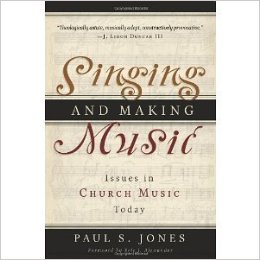In Singing and Making Music by Paul Jones, organist and music Director of Tenth Presbyterian Church, Philadelphia, describes the church’s music program for children, The Tenth Schola Cantorum:
From the Middle Ages the Church was the center of musical, religious and even general education. Churches had schools of singing called schola cantorum in which the music of the church was learned by young choirboys and men. In the twentieth century the Church’s role in the education of children was greatly reduced, and the public or private school today that provides meaningful musical education for children is a rarity.
Singing is one of the few known eternal activities (Isa. 6; Rev. 4-5). We must reclaim the right and responsibility to teach young Christians ‘to sing and to make music for the Lord.’ Parents, it is incumbent upon you to help us in this regard. A child’s musical aptitude is formed fully by the age of nine years, so it is important to reach children early in life. The benefits of music in learning development, memory, abstract thought, math and so forth are well documented, but aside from such benefits, the primary advantage is musical literacy. Yet the Church in recent decades largely has ignored this important opportunity to train children.
Therefore we have decided to introduce a comprehensive church music education program for the purpose of developing musical literacy in children ages 3-12, focusing on the ability to sing. Inherent in such a program will be a biblical view of music in worship, an historical perspective as it relates to church music, and a dynamic application of musical skills through choral ensembles. Learning nine hymns annually (one each month of the school year, September-May) will be a fantastic complement to the Scripture memory program in place in the Bible School.
The objectives of the Tenth Schola Cantorum are:
~ To develop the children’s musical literacy (defined at the highest level as the ability to vocally perform unfamiliar music from notation with tonal and rhythmic accuracy combined with appropriate musical expression) for the purpose of participating in individual and corporate worship through music.
~ To develop the children’s singing voices through training in correct vocal production and to increase their enjoyment of music through all aspects of the program.
~ To develop the children’s understanding of and appreciation for the roles of music in worship and worship itself as taught in Scripture. ~ To deepen the children’s comprehension and love of hymnody.
~ To deepen the children’s knowledge of Scripture and the Lord Jesus Christ through the texts of the songs that constitute the program curriculum.
Children will be involved in tonal and rhythm classes (with many activities) and in choir, with a snack break involved. There is no fee to any child or family. Parents will complete a registration form for each child, and the child’s regular attendance is necessary. The staff will be comprised of professional music educators who are members of the church, assisted by others, under the authority of the Music Director and the Family Life Commission.
This may mean a change of current Sunday schedules and considerable effort for many parents, but we sincerely hope that such an important opportunity for your children will be viewed favorably. It will take commitment, but the rewards (spiritual, musical, social and intellectual) will be great. s.D.g.”
– Paul S. Jones, Singing and Making Music: Issues in Church Music Today (Phillipsburg, NJ: P &R Publishing, 2006), 151-152.
